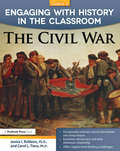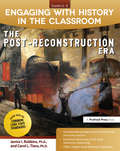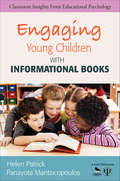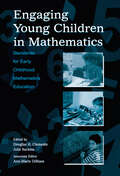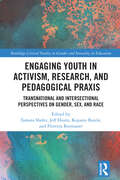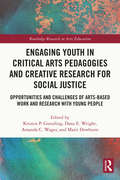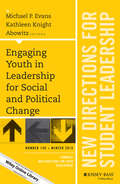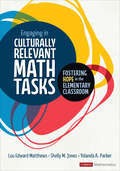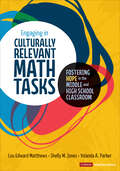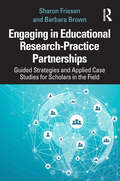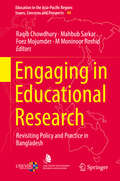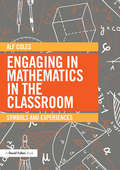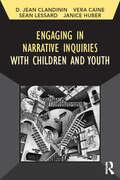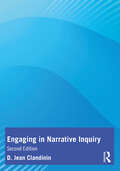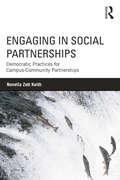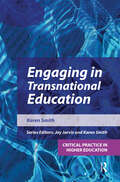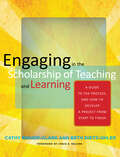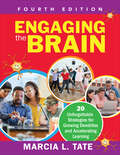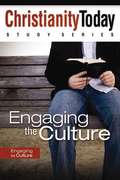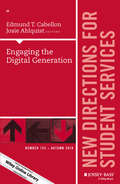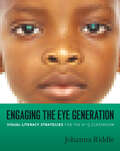- Table View
- List View
Engaging With History in the Classroom: The Civil War (Grades 6-8)
by Janice I. Robbins Carol L. TiesoEngaging With History in the Classroom: The Civil War is the second in a series of middle-grade U.S. history units that focus on what it means to be an American citizen, living in a democracy that expects as much from its citizens as it provides to them. In every lesson, students are asked to step into the world of 19th-century America, to hear about and to see what was happening, to read the words of real people and to imagine their hopes, dreams, and feelings. Students also learn to question the accounts left behind and to recognize different perspectives on events that divided the nation but resulted in progress in the path to liberty for all. Resources for teachers include a running script useful as a model for guiding conceptualization as well as extensive teacher notes with practical suggestion for personalizing activities.Grades 6-8
Engaging With History in the Classroom: The Post-Reconstruction Era (Grades 6-8)
by Janice I. RobbinsEngaging With History in the Classroom: The Post-Reconstruction Era is the third in a series of middle-grade U.S. history units that focus on what it means to be an American citizen, living in a democracy that expects as much from its citizens as it provides to them. In every lesson, students are asked to step into the world of the post-Reconstruction and industrialization era, to hear about and to see what was happening, to read the words of real people, and to imagine their hopes, dreams, and feelings. Students also learn to question the accounts left behind and to recognize different perspectives on the amazing changes in the social, political, and economic profile of America. Resources for teachers include a running script that's useful as a model for guiding conceptualization as well as extensive teacher notes with practical suggestions for personalizing activities. Grades 6-8
Engaging Young Children With Informational Books
by Helen Patrick P. Youli MantzicopoulosBecause nonfiction and young readers are a natural fit! Common Core or not, providing our youngest readers with a thorough grounding in nonfiction is just good teaching. There’s no better way to ensure our students acquire the background knowledge and vocabulary so essential to their understanding of subjects like science and social studies. Helen Patrick and Panayota Mantzicopoulos have written this book to assist you with this all-important effort. Inside you’ll find: Criteria for choosing books Strategies for shared reading and reading aloud Informational writing activities Ways to guide parent involvement Real-life classroom success stories
Engaging Young Children in Mathematics: Standards for Early Childhood Mathematics Education (Studies in Mathematical Thinking and Learning Series)
by Douglas H. Clements Julie Sarama Ann-Marie DiBiaseThis book consists of conclusions drawn from the expertise shared at the Conference on Standards for Prekindergarten and Kindergarten Mathematics Education. It offers substantive detail regarding young students' understandings of mathematical ideas.
Engaging Youth in Activism, Research and Pedagogical Praxis: Transnational and Intersectional Perspectives on Gender, Sex, and Race (Routledge Critical Studies in Gender and Sexuality in Education)
by Floretta Boonzaier Jeff Hearn Tamara Shefer Kopano RateleEngaging Youth in Activism, Research and Pedagogical Praxis: Transnational and Intersectional Perspectives on Gender, Sex, and Race offers critical perspectives on contemporary research and practice directed at young people across the global north and south. Drawing upon pedagogical, programmatic, and activist work with respect to challenging inequalities and injustices for young people, the authors interrogate the dominant discourses of sexuality, gender, race, class, age and other social categories. Emerging out of a Finnish-South African collaboration, this volume does not take a comparative approach but rather a transnational one by embracing the intersections of local and global knowledges. We draw on this transnational and transdisciplinary framework and these various contexts to generate a critique of mainstream theory and pedagogical practice, as well as to subvert and disrupt such research and practice so as to speak more directly to young people's agentic and activist engagements in social justice, specifically inequalities of class, race, gender, age, sexuality, ability, and health.
Engaging Youth in Critical Arts Pedagogies and Creative Research for Social Justice: Opportunities and Challenges of Arts-based Work and Research with Young People (Routledge Research in Arts Education)
by Marit Dewhurst Dana E. Wright Kristen P. Goessling Amanda C. WagerOriginally published as a special issue of the International Journal of Qualitative Studies in Education, this volume explores how researchers, educators, artists, and scholars can collaborate with, and engage young people in art, creative practice, and research to work towards social justice and political engagement. By critically interrogating the dominant discourses, cultural, and structural obstacles that we all face today, this volume explores the potential of critical arts pedagogies and community-based research projects to empower young people as agents of social change. Chapters offer nuanced analyses of the limits of arts-based social justice collaborations, and grapple with key ethical, practical, and methodological issues that can arise in creative approaches to youth participatory action research. Theoretical contributions are enhanced by Notes from the Field, which highlight prime examples of arts-based youth work occurring across North America. As a whole, the volume powerfully advocates for collaborative creative practices that facilitate young people to build power, hope, agency, and skills through creative social engagement. This volume will be of interest to scholars, researchers, postgraduate students, and scholar-practitioners involved in community- and arts-based research and education, as well as those working with marginalized youth to improve their opportunities and access to a quality education and to deepen their political participation and engagement in intergenerational partnerships aiming to increase the conditions for social justice.
Engaging Youth in Leadership for Social and Political Change: New Directions for Student Leadership, Number 148 (J-B SL Single Issue Student Leadership)
by Susan R. KomivesYouth leadership initiatives can help young people engage in democratic life, participatory governance, and social and political change. Leadership education oriented towards political and social change must continue to evolve in response to the lived experience of youth. This volume explores those new meanings through examining the theories and practices constituting the emerging ground of public leadership, including: research spanning secondary and higher education programs, local and international contexts, school-based and out-of-school time initiatives, and a broad diversity of youth. The Jossey-Bass quarterly report series New Directions for Student Leadership explores leadership concepts and pedagogical topics of interest to high school and college leadership educators. Issues are grounded in scholarship and feature practical applications and best practices in youth and adult leadership education.
Engaging in Culturally Relevant Math Tasks, K-5: Fostering Hope in the Elementary Classroom (Corwin Mathematics Series)
by Lou E Matthews Shelly M. Jones Yolanda A. ParkerEmpower your students as they reimagine the world around them through mathematics Culturally relevant mathematics teaching engages and empowers students, helping them learn and understand math more deeply and make connections to themselves, their communities, and the world around them. The mathematics task provides opportunities for a direct pathway to this goal; however, how can you find, adapt, and implement math tasks that build powerful learners? Engaging in Culturally Relevant Math Tasks helps teachers to design and refine inspiring mathematics learning experiences driven by the kind of high-quality and culturally relevant mathematics tasks that connect students to their world. With the goal of inspiring all students to see themselves as doers of mathematics, this book provides intensive, in-the-moment guidance and practical classroom tools that empower educators to shape culturally relevant experiences while systematically building tasks that are standards-based. It includes A pathway for moving through the process of asking, imagining, planning, creating, and improving culturally relevant math tasks. Tools and strategies for designing culturally relevant math tasks that preservice, novice, and veteran teachers can use to grow their practice day by day. Research-based teaching practices seen through the lens of culturally relevant instruction that help students develop deep conceptual understanding, procedural knowledge, fluency, and application in all K-5 mathematical content. Examples, milestones, opportunities for reflection, and discussion questions guide educators to strengthen their classroom practices, and to reimagine math instruction in response. This book is for any educator who wants to teach mathematics in a more authentic, inclusive, and meaningful way, and it is especially beneficial for teachers whose students are culturally different from them.
Engaging in Culturally Relevant Math Tasks, K-5: Fostering Hope in the Elementary Classroom (Corwin Mathematics Series)
by Lou E Matthews Shelly M. Jones Yolanda A. ParkerEmpower your students as they reimagine the world around them through mathematics Culturally relevant mathematics teaching engages and empowers students, helping them learn and understand math more deeply and make connections to themselves, their communities, and the world around them. The mathematics task provides opportunities for a direct pathway to this goal; however, how can you find, adapt, and implement math tasks that build powerful learners? Engaging in Culturally Relevant Math Tasks helps teachers to design and refine inspiring mathematics learning experiences driven by the kind of high-quality and culturally relevant mathematics tasks that connect students to their world. With the goal of inspiring all students to see themselves as doers of mathematics, this book provides intensive, in-the-moment guidance and practical classroom tools that empower educators to shape culturally relevant experiences while systematically building tasks that are standards-based. It includes A pathway for moving through the process of asking, imagining, planning, creating, and improving culturally relevant math tasks. Tools and strategies for designing culturally relevant math tasks that preservice, novice, and veteran teachers can use to grow their practice day by day. Research-based teaching practices seen through the lens of culturally relevant instruction that help students develop deep conceptual understanding, procedural knowledge, fluency, and application in all K-5 mathematical content. Examples, milestones, opportunities for reflection, and discussion questions guide educators to strengthen their classroom practices, and to reimagine math instruction in response. This book is for any educator who wants to teach mathematics in a more authentic, inclusive, and meaningful way, and it is especially beneficial for teachers whose students are culturally different from them.
Engaging in Culturally Relevant Math Tasks: Fostering Hope in the Middle and High School Classroom (Corwin Mathematics Series)
by Lou E Matthews Shelly M. Jones Yolanda A. ParkerEmpower your students as they reimagine the world around them through mathematics Culturally relevant mathematics teaching engages students by helping them learn and understand math more deeply, and make connections to themselves, their communities, and the world around them. The mathematics task provides opportunities for a direct pathway to this goal. But many teachers ask, how can you find, adapt, and implement math tasks that build powerful learners? Engaging in Culturally Relevant Math Tasks helps teachers to design and refine inspiring mathematics learning experiences driven by the kind of high-quality and culturally relevant mathematics tasks that connect students to their world. With the goal of inspiring all students to see themselves as doers of mathematics, this book provides intensive, in-the-moment guidance and practical classroom tools that empower educators to shape culturally relevant experiences while systematically building tasks that are standards-based. It includes A pathway for moving through the process of asking, imagining, planning, creating, and improving culturally relevant math tasks. Tools and strategies for designing culturally relevant math tasks that preservice, novice, and veteran teachers can use to grow their practice day by day. Research-based teaching practices seen through the lens of culturally relevant instruction that help students develop deep conceptual understanding, procedural knowledge, fluency, and application in 6-12 mathematical content. Examples, milestones, opportunities for reflection, and discussion questions guide educators to strengthen their classroom practices, and to reimagine math instruction in response. This book is for any educator who wants to teach mathematics in a more authentic, inclusive, and meaningful way, and it is especially beneficial for teachers whose students are culturally different from them.
Engaging in Culturally Relevant Math Tasks: Fostering Hope in the Middle and High School Classroom (Corwin Mathematics Series)
by Lou E Matthews Shelly M. Jones Yolanda A. ParkerEmpower your students as they reimagine the world around them through mathematics Culturally relevant mathematics teaching engages students by helping them learn and understand math more deeply, and make connections to themselves, their communities, and the world around them. The mathematics task provides opportunities for a direct pathway to this goal. But many teachers ask, how can you find, adapt, and implement math tasks that build powerful learners? Engaging in Culturally Relevant Math Tasks helps teachers to design and refine inspiring mathematics learning experiences driven by the kind of high-quality and culturally relevant mathematics tasks that connect students to their world. With the goal of inspiring all students to see themselves as doers of mathematics, this book provides intensive, in-the-moment guidance and practical classroom tools that empower educators to shape culturally relevant experiences while systematically building tasks that are standards-based. It includes A pathway for moving through the process of asking, imagining, planning, creating, and improving culturally relevant math tasks. Tools and strategies for designing culturally relevant math tasks that preservice, novice, and veteran teachers can use to grow their practice day by day. Research-based teaching practices seen through the lens of culturally relevant instruction that help students develop deep conceptual understanding, procedural knowledge, fluency, and application in 6-12 mathematical content. Examples, milestones, opportunities for reflection, and discussion questions guide educators to strengthen their classroom practices, and to reimagine math instruction in response. This book is for any educator who wants to teach mathematics in a more authentic, inclusive, and meaningful way, and it is especially beneficial for teachers whose students are culturally different from them.
Engaging in Educational Research-Practice Partnerships: Guided Strategies and Applied Case Studies for Scholars in the Field
by Sharon Friesen Barbara BrownEngaging in Educational Research-Practice Partnerships guides academic researchers into forming mutually respectful, collaborative, and scalable partnerships with school practitioners. Despite robust theoretical and conceptual planning, research on learning is often removed from real settings and generates findings with limited practical relevance, yielding frustration for K-12 stakeholders. This book provides invaluable resources to researchers seeking to work with practitioners as they solve problems and improve outcomes while answering fundamental questions about who gets to generate knowledge, from where, to whom, and in what contexts. A range of illustrative case studies and strategies explores how to apply appropriate theories and methodologies, negotiate agendas that ensure mutually beneficial goals, determine the role of pracademics, establish institutional supports, policies, and procedures that amplify impact and sustainability, and much more.
Engaging in Educational Research: Revisiting Policy and Practice in Bangladesh (Education in the Asia-Pacific Region: Issues, Concerns and Prospects #44)
by Raqib Chowdhury Mahbub Sarkar Foez Mojumder M Moninoor RoshidThis book reflects the paradigm shift now manifesting in Bangladesh’s education system by highlighting recent empirical research. It shares essential insights by presenting research conducted on diverse aspects of current day education in Bangladesh, including policy and governance, equity, access and participation, curriculum and pedagogy, assessment, and education programs and projects run by NGOs. Further, it offers a platform for these unique studies to be showcased and disseminated to scholars and researchers from developing and developed countries alike, and represents a unique reference resource for the education research community in Bangladesh, Asia and all over the world.With Foreword from Professor Serajul Islam Choudhury.
Engaging in Mathematics in the Classroom: Symbols and experiences
by Alf ColesWhat comes first, class management or student engagement? How can the ‘real world’ be used to engage learners? What is the role of technology in engaging students? And is ‘understanding’ or ‘exam success’ more engaging? In the modern world, success in school mathematics can determine life chances. It is therefore vital to engage children and young people in learning mathematics. Engaging in Mathematics in the Classroom brings together the debates concerning mathematical engagement and draws on first-hand experience and key research to promote successful classroom practice. It considers what engagement looks like at different ages and the implications of this for the classroom. Accessibly written with examples of successful classroom practice, activities and projects, the book covers: Planning and managing engagement in learning; Mathematical understandings and meanings; Early Primary and the number system; Primary/Secondary Transition and geometrical thinking; Secondary school: Adolescence and algebraic activity; Post-16 and infinity; Learning across the lifespan. Written by a leading authority in the field, this timely text will be essential reading for all trainee and practising teachers of mathematics.
Engaging in Narrative Inquiries with Children and Youth (Developing Qualitative Inquiry #16)
by Janice Huber Vera Caine Sean Lessard Jean ClandininRenowned scholar and founder of the practice of narrative inquiry, D. Jean Clandinin, and her coauthors provide researchers with the theoretical underpinnings and processes for conducting narrative inquiry with children and youth. Exploring the unique ability of narratives to elucidate the worldview of research subjects, the authors highlight the unique steps and issues of working with these special populations. The authors address key ethical issues of anonymity and confidentiality, the relational issues of co-composing field and research texts with subjects, and working within the familial contexts of children and youth; include numerous examples from the authors’ studies and others – many from indigenous communities-- to show narrative inquiry in action; should be invaluable to researchers in education, family relations, child development, and children’s health and services.
Engaging in Narrative Inquiry
by D. Jean ClandininIn Engaging in Narrative Inquiry, Second Edition, D. Jean Clandinin, a pioneer in narrative research, updates her classic formulation on narrative inquiry, clarifying, extending, and refining methods. This updated edition looks at changes and developments in the field since the publication of the first edition in 2013, exploring how narrative inquiry explores human lives through a narrative lens that honors experience as a source of important knowledge and understanding. The book includes several exemplary cases with the author’s critique and analysis of the work. The following are new to this edition: New exemplary cases, including Menon’s autobiographical narrative inquiry as the starting point for framing a research puzzle and justifying a study, Chung’s account of a study that begins with living alongside participants, and a paper from Swanson’s autobiographical narrative inquiry An expanded discussion of the philosophical grounding of narrative inquiry An expanded discussion of relational ethics in narrative inquiry that highlights links to a relational ontology An updated account of the field of narrative inquiry that highlights future directions, including the necessity of response groups, and questions of responsibility and community The increasing interest in narrative inquiry as research methodology across disciplines makes this book an essential guide and an excellent text for graduate courses in qualitative inquiry, education and nursing research, sociology, and all courses in autobiographical and narrative research and inquiry.
Engaging in Social Partnerships: Democratic Practices for Campus-Community Partnerships
by Novella Zett KeithEngaging in Social Partnerships helps practitioners advance democratic engagement by creating spaces where institutions of higher education, community groups, and other organizations can come together. This important book prepares higher education professionals to become reflective practitioners while working in collaborations that span not only the boundaries of organizations, but also borders created by the social divides of class, race, ethnicity, culture, professional expertise, and power. Through illustrative cases, Keith explores effective models of democratic engagement for university-community partnerships, as well as approaches to overcoming obstacles and assessing process and outcome. Current and future professionals in higher education will find this a valuable resource as they explore the power of engaging in collaborations that cross social divides, while enacting practices that are more equitable and democratic.
Engaging in Transnational Education (Critical Practice in Higher Education)
by Karen MpamhangaThis book offers a clear and concise introduction to transnational higher education. Drawing on research, current sector guidance and policy, it asks critical questions about the role and nature of transnational education, motivations for engaging in transnational education, how transnational education is quality assured, and how it might develop in the future. It unpacks some of the differences in practice, and their inherent complexities, in an accessible way, encouraging the reader to consider their own role and context.Critical Practice in Higher Education is a series which provides a scholarly and practical entry point for academics into key areas of higher education practice. Each book in the series explores an individual topic in depth, providing an overview in relation to current thinking and practice, informed by recent research. The series will be of interest to those engaged in the study of higher education, those involved in leading learning and teaching or working in academic development, and individuals seeking to explore particular topics of professional interest. Through critical engagement, this series aims to promote an expanded notion of being an academic – connecting research, teaching, scholarship, community engagement and leadership – while developing confidence and authority.Having spent my time researching practitioner (both host and overseas) interactions in TNE, I passionately believe that practitioner engagement and participation is fundamental to the successful delivery of any TNE initiative. I am therefore delighted to endorse this book and recommend it to any practitioner who wishes to understand the phenomenon of TNE in greater detail to improve their knowledge and practice. Dr C M Bordogna.
Engaging in the Scholarship of Teaching and Learning: A Guide to the Process, and How to Develop a Project from Start to Finish
by Beth Dietz-Uhler Cathy Bishop-ClarkThis is a book for anyone who has ever considered engaging in the scholarship of teaching and learning – known familiarly as SoTL – and needs a better understanding of what it is, and how to engage in it. The authors describe how to create a SoTL project, its implications for promotion and tenure, and how it fosters:* Increased satisfaction and fulfillment in teaching* Improved student learning* Increased productivity of scholarly publication* Collaboration with colleagues across disciplines* Contributing to a growing and important body of literatureThis guide provides prospective SoTL scholars with the necessary background information, foundational theory, tools, resources, and methodology to develop their own SoTL projects, taking the reader through the five stages of the process: Generating a research question; Designing the study; Collecting the data; Analyzing the data; and Presenting and publishing your SoTL project. Each stage is illustrated by examples of actual SoTL studies, and is accompanied by worksheets to help the reader refine ideas and map out his or her next steps. The process and worksheets are the fruit of the successful SoTL workshops the authors have offered at their institution for many years. SoTL differs from scholarly and reflective teaching in that it not only involves questioning one’s teaching or a teaching strategy, but also formally gathering and exploring evidence, researching the literature, refining and testing practices, and finally going public. The purpose of SoTL is not just to make an impact on student learning, but through formal, peer-reviewed communication, to contribute to the larger knowledge base on teaching and learning. While the roots of SoTL go back some 30 years, it was Ernest Boyer in his classic Scholarship Reconsidered who made the case for the parity of the scholarships of integration, of discovery, of application, and of scholarship of teaching as vital to the health of higher education. Glassick, Huber, and Maeroff ’s subsequent Scholarship Assessed articulated the quality standards for SoTL, since when the field has burgeoned with the formation of related associations, a proliferation of conferences, the launching of numerous journals, and increasing recognition and validation by institutions.
Engaging the Brain: 20 Unforgettable Strategies for Growing Dendrites and Accelerating Learning
by Marcia L. TateCreate unforgettable learning experiences for your students What can you do when students would rather socialize than pay attention to your lesson? When students appear to lack motivation, how do teachers ensure that learning sticks? How can you best respond to learning loss caused by the pandemic? In this new edition of Marcia Tate’s wildly bestselling Worksheets Don′t Grow Dendrites, 20 field-tested, brain-compatible instructional strategies designed to maximize memory are supported by new classroom applications and research. In each chapter devoted to an individual strategy, you′ll discover: The latest research on how the brain benefits when the strategy is used How the strategy engages all students and addresses common behavior problems Sample classroom activities for various grade levels that teachers can implement immediately Action plans for incorporating each strategy to accelerate learning When students actively engage in learning, they stand a much better chance of retaining what we want them to know. As students face setbacks and learning gaps, it′s imperative that we quickly bridge these divides by teaching them in the way their brains learn best.
Engaging the Brain: 20 Unforgettable Strategies for Growing Dendrites and Accelerating Learning
by Marcia L. TateCreate unforgettable learning experiences for your students What can you do when students would rather socialize than pay attention to your lesson? When students appear to lack motivation, how do teachers ensure that learning sticks? How can you best respond to learning loss caused by the pandemic? In this new edition of Marcia Tate’s wildly bestselling Worksheets Don′t Grow Dendrites, 20 field-tested, brain-compatible instructional strategies designed to maximize memory are supported by new classroom applications and research. In each chapter devoted to an individual strategy, you′ll discover: The latest research on how the brain benefits when the strategy is used How the strategy engages all students and addresses common behavior problems Sample classroom activities for various grade levels that teachers can implement immediately Action plans for incorporating each strategy to accelerate learning When students actively engage in learning, they stand a much better chance of retaining what we want them to know. As students face setbacks and learning gaps, it′s imperative that we quickly bridge these divides by teaching them in the way their brains learn best.
Engaging the Culture (Christianity Today Study Series)
by ZondervanThe Christian Today Study Series delves into today's vital cultural issues to get to the heart of what these topics mean to you.Each 8-week study is based on articles written by some of today's leading Christian authors and published by the Christianity Today magazines. These remarkable studies will foster deep, authentic, and relevant discussion that will challenge and grow any small group.Engaging the Culture will take on a variety of topics, such as:Culture . . . Love It? Leave It? Or Transform It?Kingdom-Minded Living in the Kingdom of This WorldEngaging the SkepticsCultural Stereotypes and Misconceptions of ChristianityBased on articles by a variety of authors, such as:Philip YanceyMark GalliMichael Horton
Engaging the Digital Generation: New Directions for Student Services, Number 155 (J-B SS Single Issue Student Services)
by Edmund T. Cabellon Josie AhlquistTake an in depth look at technology trends and the practices, possibilities, and direction needed to integrate a technology-open mindset into the work of a student affairs educator.This volume explores ways practitioners can engage the digital generation of students and colleagues on their campuses and beyond. Topics covered include: Student affairs administrators’ use of digital technology and how to develop and utilize their digital identities Increasing digital fluency and creating a more intentional digital mindset among senior student affairs officers College student development in digitized spaces and the application of digital data in student engagement efforts The development of guiding documents to inform digital and social strategies. This is the 155th volume of this Jossey-Bass higher education quarterly series. An indispensable resource for vice presidents of student affairs, deans of students, student counselors, and other student services professionals, New Directions for Student Services offers guidelines and programs for aiding students in their total development: emotional, social, physical, and intellectual.
Engaging the Disengaged
by Tarquam McKenna Marcelle Cacciattolo Mark Vicars Tarquam Mckenna Marcelle CacciattoloEngaging the Disengaged addresses strategies and models of immersive teaching and learning that lead to successful schooling outcomes. The new Australian Curriculum emphasises the importance of improved educational participation. This book will equip pre-service teachers with the tools and strategies they need to successfully implement these priorities. Drawing together a diverse range of experts, this book offers innovative ways of thinking about student engagement. Addressing education across early primary, middle and secondary school levels, it explores how differences in culture, sexuality and wealth can alienate students, and examines challenges faced by schools in rural, remote and high-poverty settings. It also offers new ideas for engaging students in subjects such as mathematics, physical education and the arts. Contemporary, real-life case studies help connect theory to practice. Each chapter also includes learning objectives, further reading suggestions and a reflective closure, as well as a set of strategies for invigorating disadvantaged students.
Engaging the Eye Generation: Visual Literacy Strategies for the K-5 Classroom
by Johanna RiddleLiteracy in the twenty-first century means more than just reading and writing. Today's students must learn how to interpret and communicate information through a variety of digital and print-based media formats, using imagery, online applications, audio, video, and traditional texts.
